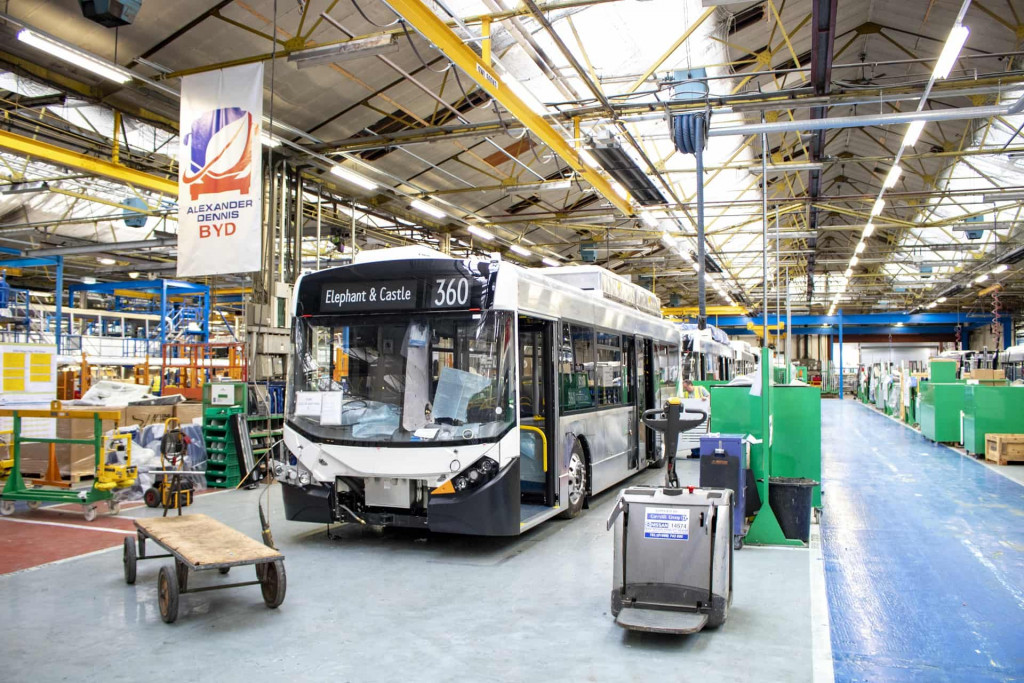With a Brexit deal finalised at the end of 2020 and the COVID-19 vaccination rollout programme well underway, manufacturers expect 2021 to be a better year. But global shocks are not going away. As Will Stirling reports, organisations are uniting to show companies which source parts from abroad that there are alternative UK suppliers who can offer short lead-times, high quality, proximity and ease of doing business.
In early January, British bus maker Alexander Dennis (ADL) announced it will manufacture the chassis for both its BYD ADL branded single- and double-deck electric buses in the UK. Previously, the chassis were made in parent company BYD’s factories in Hungary and China and shipped to the UK for assembly, with the change ensuring that complete vehicles will be made in Britain. Both countries are known for having lower production costs than the UK.
It is the latest strong example of ‘reshoring’, or companies moving production of a key component to the UK from abroad or, in some cases, relocating whole factories to the UK. The reshoring trend, which was established long before the coronavirus pandemic, has several logical reasons behind it, but the two most important today are probably Brexit and COVID-19 and the supply chain disruption that both cause.
Shorter supply chains in the UK means faster parts delivery and therefore faster customer deliveries, often better quality, as well as quicker, native communication with the supplier, who can be visited in hours or minutes. There is also rising public popularity in ‘Made in Britain’, with a rise of devoted groups, brands and Twitter accounts championing local makers, and a tangible public sense of support for local companies during an incredibly tough 2020 for business.
While the notion of bringing manufacturing home is supported by many, it is challenging in practice. A big barrier to many firms, says Julia Moore, CEO of the Gauge and Toolmakers Association (GTMA), is the lack of visibility of alternative, UK-based suppliers of the components they need: “Purchasing managers are often given a list of suppliers to procure from, many of which are overseas, and tasked with negotiating the price,” she explains. “They just don’t know that a UK supplier of that component exists and, if they did know, might assume that the product will be more expensive.”
Find what you need – down the road
Having experience of supply chain events at the GTMA and seeing the wider problem, several years ago Julia Moore founded an online collaborative marketplace, ReshoringUK. Trade associations and research institutes can join and list their members that have a specific engineering discipline, such as forging, abrasives, fabrication, composites, additive manufacturing, CNC machining, as well as services from jigs and fixtures, CAD design and more.

Companies that need a components made from these manufacturing technologies, and who typically use foreign suppliers, can search by category and find a UK-based supplier. Quotations for quantity and price is done offline to the platform.
‘ReshoringUK’ now has more than 30 trade bodies and research groups, whose members get virtually free new business leads. Ms Moore says collaborating with and not competing against the business associations is ReshoringUK’s USP; it is the only network that unifies the communities of these groups for common benefit.
“The collaboration really took-off in March with the first COVID lockdown, when industries, perhaps for the first time, became acutely aware how vulnerable their supply chains were to a global shock,” she says. “We are unique in having 32 business associations currently working together to provide a connected UK supplier base to strengthen our manufacturing supply chains across the whole of the UK and Northern Ireland.”
Hydrogen, space and automotive look local
Three new business associations recently applied to join ReshoringUK: the Scottish Plastics and Rubber Association, Midlands Fuel Cell and Hydrogen Network (MFCHN) and UkMfgUnite, which describes itself as a free collaboration run by manufacturers for manufacturers to build a referral network.
MFCHN has over 250 organisations listed and a dedicated MHFCN Business Forum with around 30 businesses. Chairman Michaela Kendall, CEO and founder of fuel cell company Adelan, says the domestic hydrogen industry needs to help itself as UK government support here is weak; recently chemicals giant Ineos said it would make its fuel cell car in France and Ceres Power, a fuel cell company, would manufacture its fuel cells in Germany.



Leave A Comment
You must be logged in to post a comment.